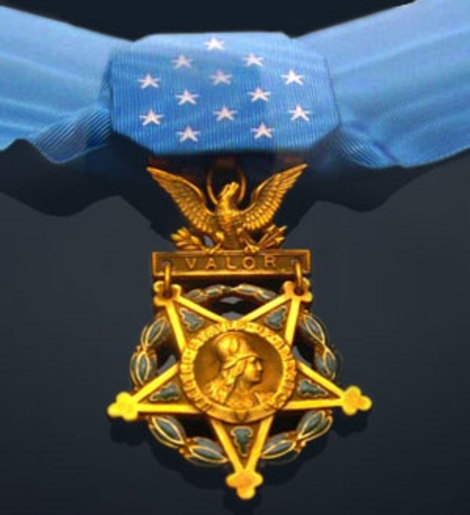
Metal of Honor - the American military's highest award |
|
Iowa Man to Receive First Non-Posthumous Metal of Honor Since Vietnam
the American military's highest award
by Thom Shanker
September 11, 2010
WASHINGTON — In the most dangerous valley of the most rugged corner of eastern Afghanistan, a small rifle team of airborne soldiers fell into an insurgent ambush, a coordinated attack from three sides.
A young Army specialist, Salvatore A. Giunta, took a bullet to the chest, but was saved by the heavy plates of his body armor. Shaking off the punch from the round, he jumped up and pulled two wounded soldiers to safety, grabbed hand grenades and ran up the trail to where his squad mates had been patrolling.
There, he saw a chilling image: Two fighters hauling one of his American comrades into the forest. Specialist Giunta hurled his grenades and emptied the clip in his automatic rifle, forcing the enemy to drop the wounded soldier. Still taking fire, he provided cover and comfort to his mortally wounded teammate until help arrived.
“It was one of the worst days of my life, and when I revisit it, it kind of guts me a little bit more every time,” the soldier, now a staff sergeant, said Friday.
For his valor during that October 2007 mission, the White House announced Friday that the 25-year-old sergeant, of Hiawatha, Iowa, would become the first living service member to receive the Medal of Honor, the military's most prestigious award, for action during any war since Vietnam. |
“President Obama said ‘thank you' for what I did,” Sergeant Giunta said in an interview from his current post in Vicenza, Italy, after getting a call from the president. “My heart was pounding out of my chest, so much that my ears almost stopped hearing. I had my wife by my side. She was holding my hand. When she heard me say, ‘Mr. President,' she gave me a squeeze.”
The soldiers of Company B, Second Battalion (Airborne), 503rd Infantry Regiment, were part of a classic hearts-and-minds campaign to provide food, winter clothing and medical care to remote Afghan villagers — and to assure them that the American and Afghan troops were a stronger force for security than the insurgents. After months of patrols in the Korangal Valley that cost the American military dearly, the outposts there were disbanded this spring, with forces moved to provide security to larger population centers. The military's travails in the valley were described by Elizabeth Rubin in The New York Times Magazine on Feb. 24, 2008, and formed a section of a recently published book, “War,” by Sebastian Junger.
Sergeant Giunta does not discuss strategy or policy when he reflects on that night, during which two paratroopers died and most of the patrol received serious injuries.
“I entered the Army when I was 18, and I'm 25 now. I became a man in the Army,” he said. “That night I learned a lot — and after that night I learned even more. This respect that people are giving to me? This was one moment. In my battalion, I am mediocre at best. This shows how great the rest of them are.”
The official White House statement differs. “His courage and leadership while under extreme enemy fire were integral to his platoon's ability to defeat an enemy ambush and recover a fellow American paratrooper from enemy hands,” the statement said. The date for his medal ceremony has not been set. Sergeant Giunta has served two deployments to Afghanistan.
Six service members have been awarded Medals of Honor, all posthumously, for operations since September 2001, according to Pentagon statistics. The White House announced Thursday that another would be awarded on Oct. 6, again posthumously. The honoree is Staff Sgt. Robert J. Miller of Army Special Forces, who, on a mission in Afghanistan on Jan. 25, 2008, sacrificed his life to save the lives of other American and Afghan troops.
According to Pentagon statistics, 464 Medals of Honor were awarded during World War II, 133 during the Korean conflict and 246 during the war in Vietnam. An analysis by Army Times last year said that there were, on average, two or three Medals of Honor awarded per 100,000 service personnel in previous wars — but that the rate for the conflicts in Iraq and Afghanistan had averaged one per million.
That discrepancy has troubled some military personnel and members of Congress, who have asked whether officials have been reluctant to honor service personnel — especially living ones — because of instances in which well-publicized stories of combat bravery have been proved incorrect.
Pentagon officials say the decisions reflect the differences of modern warfare. |